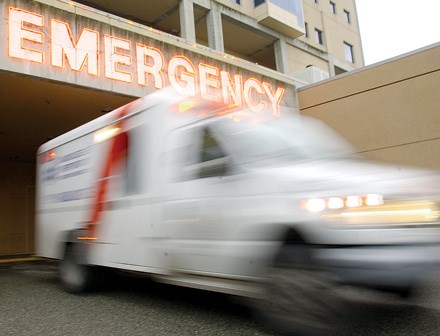It’s taking too long for paramedics to reach patients with severe injuries and illness, putting people at risk, says B.C.’s auditor general.
And more needs to be done to bring firefighters — including Coquitlam Fire Rescue — in line with B.C. Emergency Health Services, added Carol Bellringer in a report released Wednesday.
“It’s a concern until we see some dramatic improvements in all of the numbers on both the outcomes and the response time,” Bellringer told media at a news conference.
Ambulance response times in urban areas achieved the nine minute or less target 50 per cent of the time in 2016, well below the 70 per cent BCEHS target. In 2018, crews hit that target response time 51 per cent of the time, improving a single percentage point after more staff were added and new procedures put in place.
In some cases, paramedics didn’t arrive for 45 minutes, a number Bellringer agreed was troublesome when pressed by a reporter.
But she said BCEHS is doing a number of things to reduce response times, including increasing the number of paramedics and ambulances, as well as introducing a new dispatch approach and other alternatives to traditional emergency response for patients.
For example, BCEHS is pursuing alternatives to traditional emergency response for patients who do not require transport to a hospital. This includes providing medical advice over the phone, transporting patients to a health clinic or having paramedics provide treatment in private homes or the community.

The audit’s findings are important because people are more likely to survive a serious illness, such as a cardiac arrest, when arrival times are prompt. But the report notes that trends are improving in B.C. Take, for example, the fact that 16 per cent of cardiac patients who experienced symptoms outside the hospital survived in 2016, compared to 9 per cent in 2006.
In 2017, BCEHS dispatched paramedics and first responders to 7,101 cardiac arrest events, or about one per cent of all pre-hospital medical events.
Bellringer’s audit recommended the BCEHS review its performance indicators and standards for appropriate patient care and to publicly report its targets and performance.
It also called on the Ministry of Health to bring B.C. municipalities under the umbrella of BCEHS, which is responsible for emergency response services in the province.
The report notes most local governments have signed agreements with BCEHS, but a few have not, including Coquitlam.
Without agreements in place, BCEHS doesn’t have medical oversight to ensure that care meets acceptable standards and lacks the data necessary to make sure patients are getting the right medical interventions at the right time.
Agreements would also better outline the roles and responsibilities of fire departments, including the level of care provided, and would ensure that first responders are being notified of events when they can best contribute to patient care.
Bellringer said, for example, that signed agreements would ensure there is a standard of care where everyone uses the same procedures. She cites a case where auditors heard different responders using different methods to clear the airway of an overdose patient.
However, she said without agreements in place and the sharing of data, it was difficult to know if standards of care were inconsistent.
“Those are the kinds of details we would get into,” Bellringer said.
The recommendations follow concerns raised by by Coquitlam Fire Chief Jim Ogloff and Port Coquitlam Fire Chief Nick Delmonico in The Tri-City News earlier this year about instances where response times were delayed but could have been shortened if firefighters were immediately notified.
At the time there was concern that it took 22 minutes for first responders to arrive and attend a Coquitlam Express forward who had been knocked unconscious during a hockey game against the Powell River Kings.
Coquitlam Fire and Rescue was only informed of the incident when a second 911 call was made specifically requesting firefighters attend. It took fire crews six minutes to get to the arena after being notified.
According to the audit, BCEHS has seen call volumes increase by 23 per cent between 2013 and 2018, and projects an annual growth of 6 per cent through to 2020.
The Tri-City News asked Coquitlam Mayor Richard Stewart's office why the city doesn’t have an agreement with the BCEHS but did not receive a response by the time of publication.



